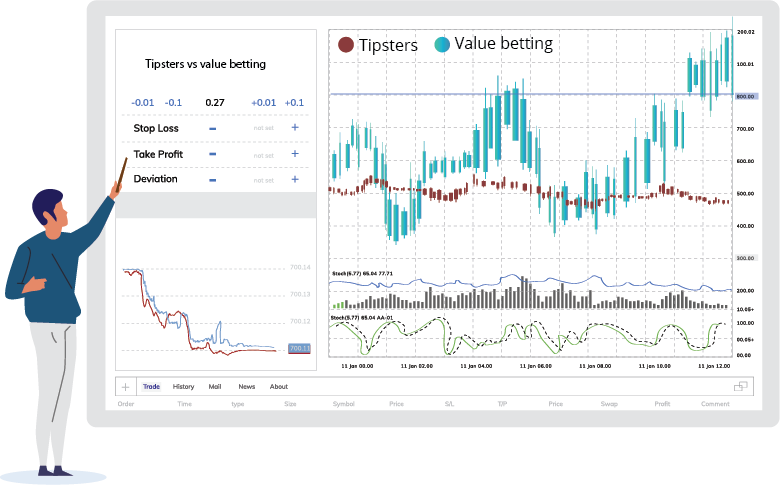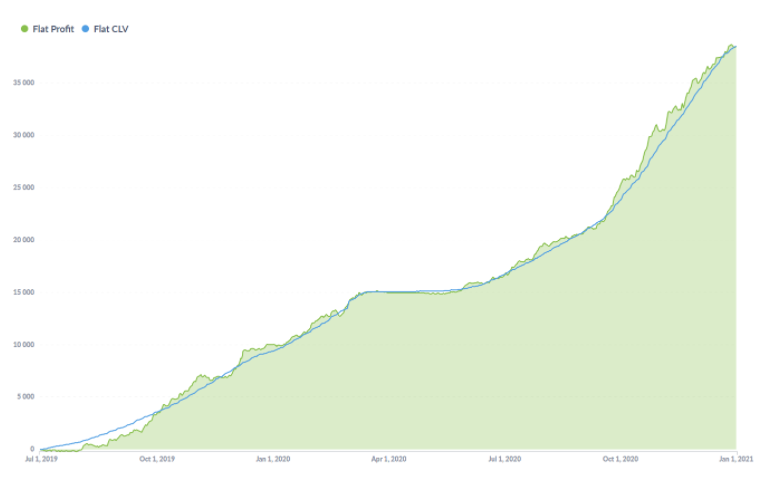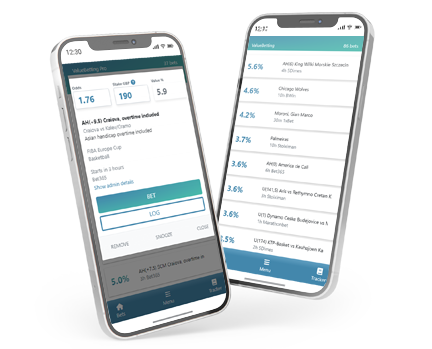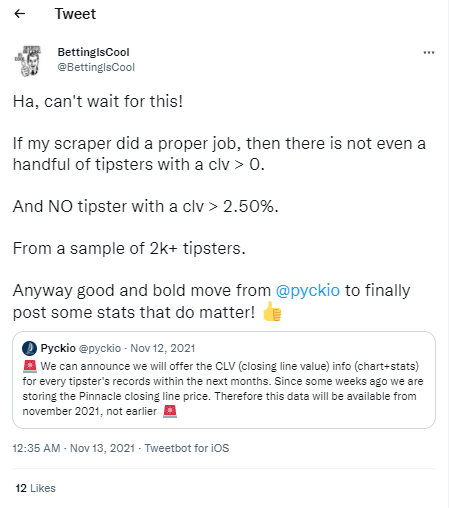Nenko, founder of Church of Betting.
Even though the sports betting industry will hardly ever admit it, everyone betting on sports is doing so with the hope of making a profit. While there is always an element of fun to it, we do play to win. This is a game at which most players fail miserably.

Although a punter can often generate a winning record due to sheer luck, the number of players who beat the market reliably and consistently seems to be negligent. Different numbers are being thrown around the web, most around the mark of 5-10%. In fact, I would expect those figures to be somewhat inflated, considering the effects of multi-accounting. If I have to guess I will probably go with around 3% – the majority of which would probably be using scalping techniques as opposed to any kind of fundamental analysis.
Your sports betting tipster is a scam
RebelBetting will beat your tipster – every time. Check out the video to understand why:
While the numbers seem strikingly low at first, it makes sense if you think about it – this is why bookmakers are in this business after all. Beating the book consistently is hard and there is a good reason for it. Finding value on the betting markets requires an accurate calculation of the probability of different event outcomes happening. This is no child's play.
The bare minimum you need to calculate the probability of an outcome somewhat accurately in a sports game includes:
- a large sample of complete, high-quality historical data
- a solid knowledge and understanding of statistics
- at least a moderate understanding of the sport
- some programming skills to be able to stitch it all together
With that in mind, is it any wonder that a large betting corporation is in a much better position to outperform the average bettor at the task of calculating the odds of an event? What chance does a punter even have to beat the bookie at its own game?

The invisible hand
As if all that is not enough, there comes another, even stronger force that eventually wipes all value away. That force is the invisible hand of the market. As more and more bettors are looking for value on a market, every winning strategy, every profitable angle, eventually gets discovered by enough market participants, so that the price of placing the bets increases to where they are no longer profitable. Therefore, in any profitable strategy, there is a tendency for the odds of all value selections to decrease in time. That is true both for the single bet from the time of market opening till the beginning of the event, as well as from a long-term perspective for all bets of such strategy on a multi-event scale. In betting, the market price is everything and the later you arrive for the party, the less is there being left for you. No bet is worth it at any price (not even on a fixed match, as we will see later) and this is one of the first lessons we need to learn as bettors.
Value fever
For the above reasons, the more we bet, the more we realise that value on the betting markets is hard to find. We are struck by a value fever. We become desperate to discover the coveted profitable angle, which will finally deliver us the long-awaited betting profits. Value is a scarce good in high demand and as such, there is a never-ending line of products and services that try to satisfy this demand.
This is where RebelBetting is operating, offering a technical approach for value discovery. If a single bookmaker is offering a price that is significantly better compared to the rest of the betting market, it is reasonable to assume that this price offers value. The evidence strongly supports the theory, as the profits offered by the RebelBetting value betting service, closely follows the closing line value of those bets.

Profit from RebelBetting value betting customers closely follows the closing line value (1.5M bets)
You can easily verify whether a bet offered by the software really deviates from the market. All it takes is checking the price of the same event at another bookmaker, preferably a sharp one. If the prices are significantly different, the tool does what it is supposed to do. You can place a bet and be confident that on a long enough timeline you will see a profit. But you have to place it fast – remember, time is not your friend here.
Clearly, while the strategy is as reliable as it gets, it is still not a money printing machine. For one, there is a certain amount of minimal capital that is required, so that the betting profits net of the service subscription fee offer reasonable compensation for the time necessary to place the bets and just keep the whole operation running. Next comes the betting variance, which at times can make you doubt even the most solid betting strategy. You also need to make sure that you avoid selection bias when value betting at all costs – as being biased will cost you long-term profit.
Furthermore, the bookmaker isn't exactly happy to accommodate customers, who are making a profit, since a dollar won by the punter is a dollar lost by the bookmaker. Therefore, anyone consistently making a profit is sooner or later shown the door – at least as far as the average soft bookmaker is concerned. So, what are the alternatives?
Make your own odds
Instead of screening the whole market for technical inefficiencies, another way to go about finding value is to take a more fundamental and more focused approach. Pick a niche, go in depth, and make your own odds for the event of your choice. We have already looked at the difficulties of this task at the beginning of the article. It is safe to say that excelling in this exercise is orders of magnitude more difficult to achieve than simply spotting market inefficiencies. Most people do not have the resources, time, and knowledge to make it work. That is why, they would often delegate this task to a third party, which third party is of course getting paid for its service. This third party is what we often call the tipster.
The Tipster
The tipster is a betting expert, who is using his expertise to find value in the markets and is selling this value to his customers in the form of (presumably) profitable bets. There are different subscription models ranging from a fixed monthly fee (WinnerOdds) to a fee per bet (pyckio) all the way down to a performance fee on the achieved betting profit (Mercurius).
How does a tipster service compare to a technical value betting service, such as the one RebelBetting is offering? To answer this question, we need to look in depth at the tipster business model, as well as the variety of offerings on the betting tipster market.
Reliability
Reliability is undoubtedly the biggest issue of most tipster services as compared to technical value betting. RebelBetting's value betting for one is a simple and easy to grasp product. You are getting a feed of prices diverging from the market. You know where the profit is coming from. What you see is what you get. While there are certainly quite a few technical challenges in implementing such a service, the general logic for selecting the bets is very clear.
Not so with tipsters. To identify value in a market using a fundamental approach, you would not only need to implement a variety of tools to accurately calculate the price of an event – you would also need to keep those tools secret from everyone, including your customers. If others become aware of your exact process, you are at risk of being copied and seeing the edge you discovered evaporate before your eyes. Remember the invisible hand? Therefore, as a customer, you never truly know how the tipster selects the bets he is offering.
Monkeys tossing coins
This does not necessarily mean that the bets you are buying from a tipster do not contain value (though most of the time they do not). However, it certainly means that you can hardly even tell if that is the case. Due to the volatile nature of betting returns, a winning past record does not tell you much, even if a tipster loves to use one for marketing reasons. In his article "Monkeys Tossing Coins", Chris from BettingIsCool demonstrated, that 100 simulations of 1000 random bets with negative expected value the size of the Pinnacle margin produced at least 10 records with a return bigger than 1% and the top performer had an ROI of 11.74%.
Remember that the bets which produced this ROI are completely random bets which contain no value whatsoever and in fact contain negative expected value when you factor in the margin. What is more, we are looking at a record of 1000 bets – not exactly the smallest of samples. As we can clearly see from this experiment, the winning record of a tipster rarely gives you any valuable information. And this is even before we factor in the chance that those records are falsified, which unfortunately happens way too often in this industry.
Survivorship bias
Falsifying of records may occur in the most shameless of manners, as in blatantly deleting losing picks from your Twitter feed. But also in more subtle ways. The large majority of tipsters produce negative records. Clearly, after having such a record behind him, a tipster has no motivation to maintain his account anymore. Some platforms give such tipsters the possibility to delete their accounts right away and give it another try with a new account and blank page, hoping that the variance will turn out in their favour this time.
Others diverge the focus away from those losing tipsters in other ways. But they are there and in large numbers. Focusing on winners while ignoring the losers is called the survivorship bias and is prevalent in many areas of life and especially in sports betting. It gives you a distorted picture of the percentage of profitable tipsters, which in most cases is small enough to be attributed to pure chance.
Since you are completely blind to the underlying process and you can't really bet the tipster's winning record (that is if you are confident the record itself has not been distorted), the only guarantee that the bets a tipster is selling you are any better than a monkey throwing darts are your trust in the expertise of the tipster. Well, that and of course the closing line value.
Closing line value (CLV)
Closing line value is the only truly reliable way to identify value in the bets you place and is the holy grail of sports betting. It has been written about at great length in many betting media platforms so I wouldn't want to beat the dead horse but just remind with a few sentences what the CLV is all about. We know that in time, market forces wipe away all value from the market. We can in fact use this knowledge to identify value.
A betting record where the odds for most bets have drifted between bet placement and the beginning of the event probably contains value. The consistent drift of the odds post bet placement is known as closing line value (CLV). Studies show that such consistent price shortage over a certain number of bets is a strong predictor for the expected return of those bets – much more so than the actual outcome of those bets (see above the issue with winning records). For this reason, all else equal, a series of bets with positive CLV is much more informative than a series of bets with positive ROI. That makes CLV the go-to method for evaluating a betting record – of a tipster, of a value betting service or of anything else.
As previously noted, the historical returns of RebelBetting value betting tips closely match the deviation of those bets from the market price at the time of placing the bet. Those same bets also have a positive CLV, which is again equal to the price deviation from the market. This is yet another evidence that the strategy does what it is supposed to do. CLV is a reliable predictor of profitability and as such it is even sometimes being used by bookmakers to identify winning players before they accumulate a long bet record. Which brings me to the next point.
CLV at soft bookmakers
Soft bookmakers are the ones which can't properly calculate odds and are therefore the target of any technical value betting software. The bookmakers themselves are aware of their vulnerability, therefore they ban all winning players as soon as they have been identified as such. You can still make a decent amount of money exploiting bad odds at soft bookmakers, but only for a limited time. Therefore, a profitable tipster in a soft bookmaker is likely to burn your account, just as applying any profitable strategy would. Given that fact and the low reliability of tipsters in general, if you only plan to play soft books, there is very little benefit a tipster can offer you compared to a standard value betting software such as RebelBetting.
A quick throwback to the issue of being unaware of the underlying process: not knowing exactly what you are paying for is tricky. Once I made my own "tipster account" at the tipster website TipsterTube as a little joke, or perhaps a demonstration. What I did was exclusively post bets fed to me by a technical value betting software. The trick was, I picked just the tennis bets deviating from the general market. Lo and behold, my tennis bets had great ROI and even CLV, making me a verified and successful tennis tipster!
So, let's get this out of the way. Tipping games in "soft" bookmakers is not a sustainable strategy, since if you make a profit, you will probably get limited exactly as quickly as you would if you were following a simple technical value betting strategy. In fact, you could be buying recycled and repackaged tips from a technical value betting service, only at worse terms.
Pinnacle Tipsters
For the above reason, tipsters betting exclusively at sharp bookmakers which do not limit players (which can be Pinnacle or any other of the Asian and Caribbean bookmakers) are by and large the only ones, who are actually being considered by most serious players. The only issue here is that those bookmakers are following a market model for setting and adjusting their odds and therefore have much sharper odds than the soft books. Therefore, turning a profit with them is a much bigger challenge.
Those bookmakers are also what you would normally see on the other side of an arb with bet365, William Hill or any other of the known names. In such a case the odds at the European bookie would be wrong and at the sharp bookmaker they would be right. If you are following an arbitrage strategy, in the long run you will notice that your balance is increasing in the soft books and decreasing (though at a slower pace) in the sharp ones.
It is known that sharp books are ahead of everyone else when it comes to price accuracy, but also that they do not limit winning players. Therefore, a profitable tipster at those (and only those) bookmakers would be worth his weight in gold. However, how do we discover such a tipster?
Well, a sure way to do this has just been outlined in the previous chapter – we would look for CLV. One platform that is only allowing Pinnacle tipsters and is also being (to their credit) very transparent about their tipsters' betting record and CLV is pyckio. Pyckio recently committed to publishing the CLV of all their tipsters, which was already diligently scraped by the already mentioned above fellow blogger Chris from BettingIsCool. The results?
"…not even a handful of tipsters with a clv > 0.
And NO tipster with a clv > 2.50%.
From a sample of 2k+ tipsters."
Mind you, we are talking about one of the biggest and most respected tipster platforms out there, which is therefore attracting some of the most followed names of the business. In other words, while not every name is being represented, most of them are and the sample is quite large. If these are your chances to find a CLV+ tipster at pyckio, it undoubtedly looks much worse on any less known platform out there.
It is theoretically possible that a consistently profitable tipster does not have a positive CLV, if he is acting on insider information, which is inaccessible to the wider market and therefore not priced into the closing line. Even though such people undoubtedly exist, it is questionable if they would sell such information to the broader market. Not only because it would reduce their chances to act upon that information but also because, at least in certain circumstances, doing so would be illegal.
Fixed matches
I am talking of course about fixed matches. This is probably the most extreme form of insider information. If a match is fixed, it's outcome would be virtually certain even before the event started, all the while the closing line would assign certain positive probabilities to all event outcomes – due to the market being unaware of the fact that the match is fixed.
Can you make money acting upon such information? Certainly. Would you end up behind bars for doing so? You certainly could.
Betting on fixed matches is illegal and has the potential to get you into serious trouble. This raises two questions. First, is the risk worth the profit for you to potentially engage in such action? And second, would a person having such knowledge willingly share it with you for a fee, provided he would be making himself criminally responsible in the process? For me the answer to both questions is a clear no – but to each his own.
Conclusion
So, in this article I compared technical value betting to following tipsters and shared my thoughts on the pros and cons of both strategies. As long as only soft books are involved, value betting remains my preferred strategy, due to the much better predictability of returns as compared to a tipster service. Tipster services with sharp bookmakers on the other hand are a potentially highly promising field, as a CLV+ tipster there would be a gift that would keep on giving. However, a closer look at the field shows us that such tipsters are incredibly hard to find – in fact, if you manage to find any please let me know, I promise to reward you generously! Based on my experience I wouldn't hold my breath here, but who knows, maybe I am in for a positive surprise.
Until then, I can only recommend a service that can consistently, over millions of bets, deliver CLV and yield above 3%. Trialed and tested, this is the strategy that has grown my initial bank significantly over the years.
Did you like the article? Check out this other article about why value betting outperforms tipsters everytime. For more interesting articles, see the value betting help section.
What is RebelBetting?
RebelBetting offers sports betting tools that help you turn sports betting into an investment. By using RebelBetting you can turn the bookmakers' own odds against themselves, finding profitable bet situations where you have the edge.
This is called value betting and sure betting.

Profit Guarantee
We know our products work.
In fact, we are so confident about it that we offer a Profit Guarantee.
If you don't make a betting profit in the first month you get another month for free.
Again and again until you profit. We take all the risk.
Subscribe today
Start using the fastest, most user-friendly, value betting and sure betting service on the market. At any given time, RebelBetting finds thousands of profitable bets for you to bet on.
P.S. To get the best possible offer make sure you join for a longer period of time – up to 30% off.
RebelBetting Pro
- Value bets & sure bets
- Maximize your profit
- The most profitable bets
- Access non-limiting bookies
RebelBetting Starter
- Value bets & sure bets
- Great when starting out
- ROI over 30% / month
RebelBetting Pro
- Value bets & sure bets
- Maximize your profit
- The most profitable bets
- Access non-limiting bookies
RebelBetting Starter
- Value bets & sure bets
- Great when starting out
- ROI over 30% / month


